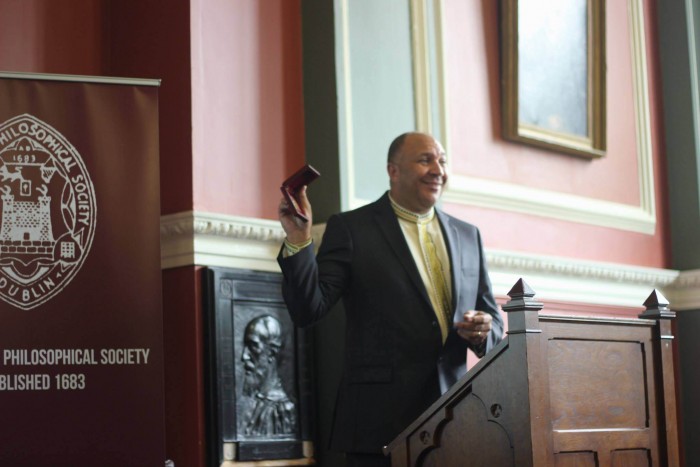Last Wednesday, amidst the hustle and bustle of Freshers’ Week, a packed GMB chamber listened in awed silence to one man’s experience of apartheid in South Africa. Chris Lubbe, the most recent recipient of The Phil’s Gold Medal of Honorary Patronage, spent his life fighting racial discrimination in his native country before being recruited to serve as Nelson Mandela’s bodyguard in the 1990s.
Like all black people in South Africa at the time, Mr Lubbe’s experiences of racism and prejudice began in his early childhood. His mother was raped by her white employee, rendering his own racial identity difficult for the authorities to ascertain. He tells of how young babies like himself were measured around their lips, nose and head in order to find out whether ‘Black’or ‘White’ should be stamped on their birth certificate. He was finally subjected to ‘the pencil test’, in which a pencil was pushed through a child’s hair. If the pencil fell quickly to the ground, the child was deemed to be white. The test was thought to be the ultimate decider of race, determining whether light-skinned black South Africans would be allowed to stay with their families. Luckily for Chris, it did not.
At six years old, Mr Lubbe’s family was relocated from their farm (which had been designated a white area) to a ghetto in the city of Durban. From then, his life was one of packed classrooms and few opportunities. He spoke of how his anger mounted gradually as he noticed beaches, shops, bathrooms and whole districts that were marked ‘Whites Only’ while his own school was cramped and his drinking water polluted. At eight, he watched as his sick diabetic mother was thrown violently off a ‘Whites Only’ bench by two policemen, resulting in a coma and near death. Eventually, after witnessing a black man thrown to his death off a moving train, Mr Lubbe decided to leave home and join the African National Congress. The man in question had committed the crime of walking through a white carriage in order to reach the coloured section.
Mr Lubbe’s life thereafter was one of incredible struggle and perseverance. He hid constantly from the police, was imprisoned and beaten. Many more of his friends died at the hands of the state. His work organising anti-apartheid protests and campaigns brought him to the attention of Nelson Mandela and he was chosen to be a bodyguard.
He travelled as his right-hand man to over 300 countries and became a close friend of both Mandela and Archbishop Desmond Tutu. During his address on Wednesday, he told of dancing with Princess Diana, meeting Denzel Washington in a hotel lobby and the Spice Girls attempts to get a photo opportunity.
Slowly, Mr Lubbe’s story moves from one of anger to one of forgiveness. The guard who beat him in prison became his co-worker and through the Truth and Reconciliation commission, as he, and the whole of South Africa, gradually came to terms with the horrors of the past. His final promise to Mandela upon leaving his service was to tell their story in order that history may never repeat itself, he said.
Photo: The Phil







